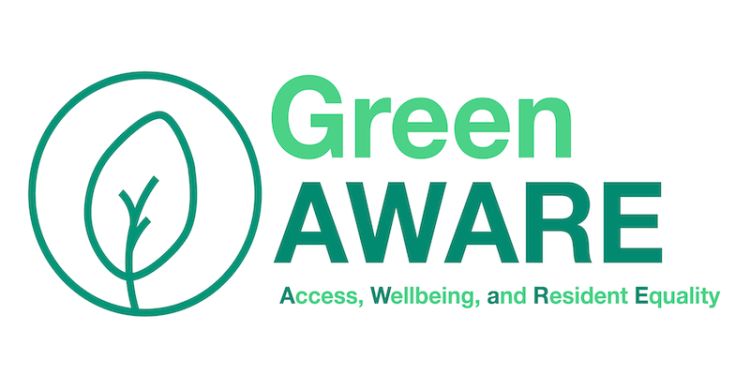
Dr Vikki Houlden
- Position: Associate Professor in Urban Data Science
- Areas of expertise: urban science; spatial inequality; greenspace; health; mental wellbeing; places left behind; GIS
- Email: V.Houlden@leeds.ac.uk
- Website: Personal Webpage | X | LinkedIn | Googlescholar | Researchgate | ORCID
Profile
I am an Associate Professor in Urban Data Science in the School of Geography, and member of the Institute for Spatial Data Science research cluster. I also work with Leeds Institute for Data Analytics (LIDA). I previously worked as a Research Associate in Spatial Inequality, within Newcastle’s Centre for Urban and Regional Development Studies (CURDS). Prior to this, I held a teaching-focussed role as Academic Technologist at the University of Warwick, where I also obtained my Doctorate with Warwick Institute for Science of Cities (WISC).
My research aims to understand the ways in which spaces and places embody inequalities, and the social structures influencing how people relate to their environment, with particular interest in how urban landscapes impact health and wellbeing. More specifically, I approach urban challenges, such as greenspace, mental health, ageing, peripheralisation and migration, through geospatial methods and theory which draw on my interdisciplinary background in urban science, data analytics, engineering and geography. As well as quantitative spatio-temporal analysis, I work with community groups, practitioners and local government, to understand and improve individual experiences of the built environment.
In my spare time, I enjoy baking, travel, yoga, and anything that involves being outdoors.
Responsibilities
- Programme Lead for MSc Urban Data Science and Analytics
- School Equity, Diversity, and Inclusion Advocate
Research interests
I’m really interested in all aspects of inequality, particularly in cities, and my main research passion is the relationship between nature and mental health.
GreenAWARE: Greenspace Access, Wellbeing, and Resident Equality
While everyone should have access to greenspace, some groups face additional challenges to visiting their local spaces, particularly those in less affluent areas, ethnic minorities, and women. This is because different people need different things from their local greenspaces- but there’s not much information out there about how we can make greenspaces accessible for everyone and meet the needs of increasingly diverse city communities. I’m the Principal Investigator for the GreenAWARE project, funded by ESRC and working with two local councils (Leeds and Bradford) to develop new understanding of intersectional urban greenspace inequality and propose ways in which greenspace can be designed and managed to reduce socio-demographic access inequalities, overcome social and cultural barriers to use, and promote wellbeing. This project looks in detail at the characteristics of both the greenspaces and those who are(n't) using them, combining a survey, map data, and focus groups with local residents and stakeholders, to identify how different people use the spaces, the barriers they face, and how to overcome these.
Bringing Cities to Life
Half of the world’s population now lives in cities, potentially disconnecting residents from the natural environments in which humans evolved and are best adapted to flourish. I perform geospatial data analytics to understand the complex socio-spatial place effects of greenspace on mental wellbeing in the urban environment. My research uses large population surveys and greenspace maps, as well as local interventions, to investigate how access to urban greenspace improves mental wellbeing. I aim to demonstrate the value of urban greenspace for mental wellbeing and how to incorporate greenery to benefit mental wellbeing.
Spatial Analysis in the Social Sciences
The interconnections between the environment, deprivation and wellbeing bring health geographies to the fore as a pressing social justice issue. Spatial characteristics are therefore fundamental to understanding the multifaceted nature of health and addressing these inequalities for future populations to flourish. I use various geospatial techniques to analyse a range of spatial and temporal datasets including individual-level social surveys, land use data and traditional administrative datasets, and increasingly with remotely-sensed data and machine learning
<h4>Research projects</h4> <p>Some research projects I'm currently working on, or have worked on, will be listed below. Our list of all <a href="https://environment.leeds.ac.uk/dir/research-projects">research projects</a> allows you to view and search the full list of projects in the faculty.</p>Primary investigator (PI)
- Green AWARE: Greenspace Access, Wellbeing, and Resident Equality
- Healthy Urban Places: a systems approach to understanding how to harness the power of local places to improve population health and reduce inequalities: HUP-North
- The impact of the Environment and Pollution On Cognitive Health (EPOCH): Building the knowledge base through international collaboration
Qualifications
- PhD in Urban Science, 2019, University of Warwick
- MSc in Data Analytics, 2015, University of Warwick
- MEng in Civil Engineering, 2014, University of Warwick
Professional memberships
- AFHAE- Associate Fellow of the Higher Education Academy
- Editorial Board member of Annals of the American Association of Geographers Journal
Student education
I am Programme Lead for the MSc in Urban Data Science and Analytics, which launched in Autumn 2021. I have taught on several modules for this programme, focussing on programming, data analytics, and industry collaboration projects.
If you’re interested in finding out more about the programme, there is a course introduction video available here.
I am PhD Supervisor for several doctoral students at the University of Leeds and within the SENSE CDT, and have also supervised MRes students. I am interested in supervising topics including greening cities, sustainable urbanisation, socio-spatial inequality, health and wellbeing, interactions with nature, social justice and peripheralisation.,
Research groups and institutes
- Institute for Spatial Data Science


